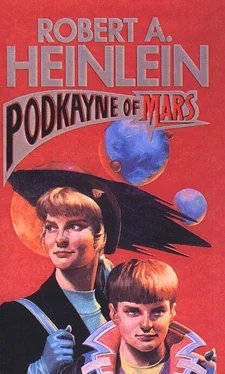Robert Heinlein - Podkayne of Mars
Здесь есть возможность читать онлайн «Robert Heinlein - Podkayne of Mars» весь текст электронной книги совершенно бесплатно (целиком полную версию без сокращений). В некоторых случаях можно слушать аудио, скачать через торрент в формате fb2 и присутствует краткое содержание. Жанр: Фантастика и фэнтези, на английском языке. Описание произведения, (предисловие) а так же отзывы посетителей доступны на портале библиотеки ЛибКат.
- Название:Podkayne of Mars
- Автор:
- Жанр:
- Год:неизвестен
- ISBN:нет данных
- Рейтинг книги:4 / 5. Голосов: 1
-
Избранное:Добавить в избранное
- Отзывы:
-
Ваша оценка:
- 80
- 1
- 2
- 3
- 4
- 5
Podkayne of Mars: краткое содержание, описание и аннотация
Предлагаем к чтению аннотацию, описание, краткое содержание или предисловие (зависит от того, что написал сам автор книги «Podkayne of Mars»). Если вы не нашли необходимую информацию о книге — напишите в комментариях, мы постараемся отыскать её.
Podkayne of Mars — читать онлайн бесплатно полную книгу (весь текст) целиком
Ниже представлен текст книги, разбитый по страницам. Система сохранения места последней прочитанной страницы, позволяет с удобством читать онлайн бесплатно книгу «Podkayne of Mars», без необходимости каждый раз заново искать на чём Вы остановились. Поставьте закладку, и сможете в любой момент перейти на страницу, на которой закончили чтение.
Интервал:
Закладка:
Which is obviously not good enough for weatherpredicting storms that can gather in a day or two, peak in a few minutes, and kill you dead in seconds or less.
So the Solar weather is watched from Earth's Luna and from Venus' satellite station as well, plus some help from Deimos. But there is speed-of-light lag in getting information from these more distant stations back to the main station on Mercury. Maybe fifteen minutes for Luna and as high as a thousand seconds for Deimos ... not good when seconds count.
But the season of bad storms is only a small part of the Sun's cycle as a variable star-say about a year out of each six. (Real years, I mean-Martian years. The Sun's cycle is about eleven of those Earth years that astronomers still insist on using.)
That makes things a lot easier; five years out of six a ship stands very little chance of being hit by a radiation storm.
But during the stormy season a careful skipper (the only sort who lives to draw a pension) will plan his orbit so that he is in the worst danger zone, say inside
the orbit of Earth, only during such time as Mercury lies between him and the Sun, so that Hermes Station can always warn him of coming trouble. That is exactly what Captain Darling had done; the Tricorn waited at Deimos nearly three weeks longer than the guaranteed sightseeing time on Mars called for by the Triangle Line's advertising, in order to place his approach to Venus so that Hermes Station could observe and warn-because we are right in the middle of the stormy season.
I suppose the Line's business office hates these expensive delays. Maybe they lose money during the stormy season. But three weeks' delay is better than losing a whole shipload of passengers.
But when the storm does start, radio communication goes all to pieces at once-Hermes Station can't warn the ships in the sky.
Stalemate? Not quite. Hermes Station can see a storm shaping up; they can spot the conditions on the Sun which are almost certainly going to produce a radiation storm very shortly. So they send out a storm warning-and the Tricorn and other ships hold radiation-shelter drills. Then we wait. One day, two days, or a whole week, and the storm either fails to develop, or it builds up and starts shooting nasty stuff in great quantities.
All during this time the space guard radio station on the dark side of Mercury sends a continuous storm warning, never an instant's break, giving a running account of how the weather looks on the Sun.
and suddenly it stops.
Maybe it's a power failure and the stand-by transmitter will cut in. Maybe it's just a "fade" and the storm hasn't broken yet and transmission will resume with reassuring words.
But it may be that the first blast of the storm has hit Mercury with the speed of light, no last-minute
warning at all, and the station's eyes are knocked out and its voice is swallowed up.in enormously more powerful radiation.
The officer-of-the-watch in the control room can't be sure and he dare not take a chance. The instant he loses Hermes Station he slaps a switch that starts a big clock with just a second hand. When that clock has ticked off a certain number of seconds-and Hermes Station is still silent-the general alarm sounds. The exact number of seconds depends on where the ship is, how far from the Sun, how much longer it will take the first blast to reach the ship after it has already hit Hermes Station.
Now here is where a captain bites his nails and gets gray hair and earns his high pay....ecause he has to decide how many seconds to set that clock for. Actually, if the first and worst blast is at the speed of light, he hasn't any warning time at all because the break in the radio signal from Hermes and that first wave front from the Sun will reach him at the same instant. Or, if the angle is unfavorable, perhaps it is his own radio reception that has been clobbered, and Hermes Station is still trying to reach him with a last-moment warning. He doesn't know.
But he does know that if he sounds the alarm and chases everybody to shelter every time the radio fades for a few seconds, he will get people so worn out and disgusted from his crying "Wolfi" that when the trouble really comes they may not move fast enough.
He knows, too, that the outer hull of his ship will stop almost anything in the electromagnetic spectrum. Among photons (and nothing else travels at speed-oflight) only the hardest X-radiation will get through to, passenger country and not much of that. But traveling along behind, falling just a little behind each second, is the really dangerous stuff-big particles, little particles, middle-sized particles, all the debris of nuclear
explosion. This stuff is moving very fast but not quite at speed-of-light. He has to get his people safe before it hits.
Captain Darling picked a delay of twenty-five seconds, for where we were and what he expected from the weather reports. I asked him how he picked it and he just grinned without looking happy and said, "I asked my grandfather's ghost."
Five times while I was in the control room the officer of the watch started that clock ... and five times contact with Hermes Station was picked up again before time ran out and the switch was opened.
The sixth time the seconds trickled away while all of us held our breaths ... and contact with Hermes wasn't picked up again and the alarm sounded like the wakeful trump of doom.
The Captain looked stony-faced and turned to duck down the hatch into the radiation shelter. I didn't move, because I expected to be allowed to remain in the control room. Strictly speaking, the control room is part of the radiation shelter, since it is just above it and is enclosed by the same layers of cascade shielding.
(It's amazing how many people think that a captain controls his ship by peering out a port as if he were driving a sand wagon. But he doesn't, of course. The control room is inside, where he can watch things much more accurately and conveniently by displays and instruments. The only viewport in the Tricorn is one at the top end of the main axis, to allow passengers to look out at the stars. But we have never been headed so that the mass of the ship would protect that sightseeing room from solar radiation, so it has been locked off this whole trip.)
I knew I was safe where I was, so I hung back, intending to take advantage of being "teacher's pet"- for I certainly didn't want to spend hours or days
stretched out on a shelf with gabbling and maybe hysterical women crowding me on both sides~
I should have known. The Captain hesitated a split second as he started down the hatch and snapped, "Come along, Miss Fries."
I came. He always calls me "Poddy"-and his voice had spank in it.
Third-class passengers were already pouring in, since they have the shortest distance to go, and crew members were mustering them into their billets. The crew has been on emergency routine ever since we first were warned by Hermes Station, with their usual one watch in three replaced by four hours on and four hours off. Part of the crew had been staying dressed in radiation armor (which must be very uncomfortable) and simply hanging around passenger country. They can't take that heavy armor off for any reason at all until their reliefs show up, dressed also in armor. These crewmen are the "chasers" who bet their lives that they can check every passenger space, root out stragglers, and still reach the shelter fast enough not to accumulate radiation poisoning. They are all volunteers and the chasers on duty when the alarm sounds get a big bonus and the other half of them who were lucky enough not to be on duty get a little bonus.
The, Chief Officer is in charge of the first section of chasers and the Purser is in charge of the second- but they don't get any bonus even though the one on duty when the alarm sounds is by tradition and law the last man to enter the safety of the shelter. This hardly seems fair ... but it is considered their honor as well as their duty.
Читать дальшеИнтервал:
Закладка:
Похожие книги на «Podkayne of Mars»
Представляем Вашему вниманию похожие книги на «Podkayne of Mars» списком для выбора. Мы отобрали схожую по названию и смыслу литературу в надежде предоставить читателям больше вариантов отыскать новые, интересные, ещё непрочитанные произведения.
Обсуждение, отзывы о книге «Podkayne of Mars» и просто собственные мнения читателей. Оставьте ваши комментарии, напишите, что Вы думаете о произведении, его смысле или главных героях. Укажите что конкретно понравилось, а что нет, и почему Вы так считаете.












